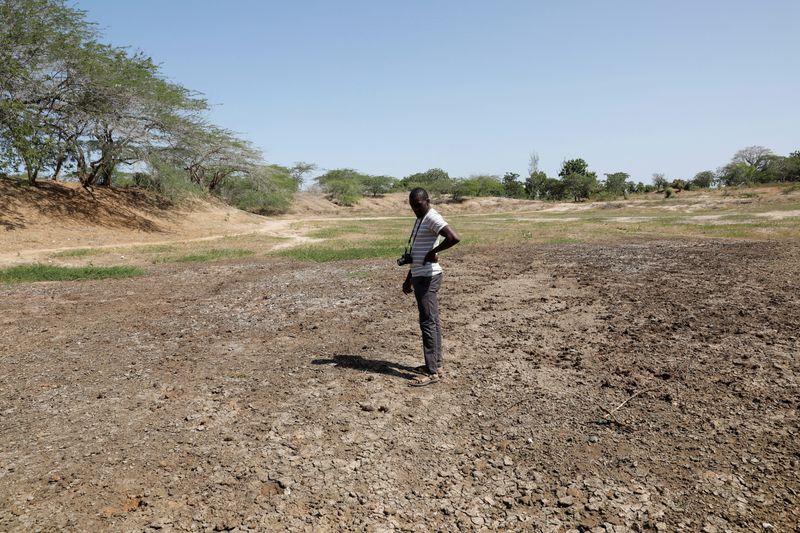
© Reuters. FILE PHOTO: Famine Early Warning System Network in Africa (FEWS NET) scientist Chris Shitote examines a dry water hole in Kilifi county, Kenya, February 16, 2022. REUTERS/Baz Ratner
By Joe Bavier
WASHINGTON (Reuters) – Africa is struggling with the triple shock of rising debt burdens, an ongoing food crisis and climate change fallout and needs more help from international institutions and wealthy nations to cope, African finance ministers said on Saturday.
Developing African economies were only beginning to recover from the COVID-19 pandemic when Russia’s invasion of Ukraine provoked capital market turmoil and an inflation acceleration that sent food prices soaring.
The continent, meanwhile, was already struggling with extreme weather events, including drought, flooding and cyclones, aggravated by climate change.
“African countries are really victims. They really aren’t responsible for these devastating effects (of climate change),” Comoros Finance Minister Mze Abdou Mohamed Chanfiou said in a news conference alongside two of his African counterparts during the International Monetary Fund (IMF) and World Bank spring meetings in Washington. The trio were speaking on behalf of the continent’s finance ministers.
“Even if the IMF, the World Bank and our regional institutions have put in place emergency funds, these funds don’t really seem sufficient to respond to this.”
The IMF created the Resilience and Sustainability Trust (RST) last year to help channel excess IMF Special Drawing Rights reserves from wealthier countries to poor and vulnerable middle-income nations.
The trust aims to provide long-term concessional financing for needs such as climate change adaptation and the transition to cleaner energy sources.
Rwanda, Barbados, Costa Rica, Bangladesh and Jamaica have already reached agreements for loan programs from the facility, and 44 others have expressed interest.
The three African finance ministers urged wealthy countries to step forward to honor their pledges to fund the trust.
IMF Managing Director Kristalina Georgieva said on Friday that the IMF had already received $40 billion in pledges for the RST. She added that more pledges had been received on Friday, “meaning that there is a very good likelihood that we can build it even further in terms of financial strength.”
The African finance ministers, meanwhile, called for a G20-backed framework aimed at helping countries restructure burdensome debt to go further.
Two African countries – Zambia and Ghana – have already defaulted on their sovereign debt since the start of the pandemic. But while they’ve signed onto the initiative, it has so far failed to provide relief.
While Africa needs more support to deal with food shortages and high food prices caused by weather phenomena and the war in Ukraine, the ministers said African governments also had their role play.
Sierra Leone Finance Minister Sheku A.F. Bangura, speaking in the same news conference on Saturday, said Africa must leverage its agricultural sector to boost domestic production and reduce its vulnerability to import disruptions.
“The crisis we have is a permanent one,” he said. “We need a much stronger and consolidated approach.”


